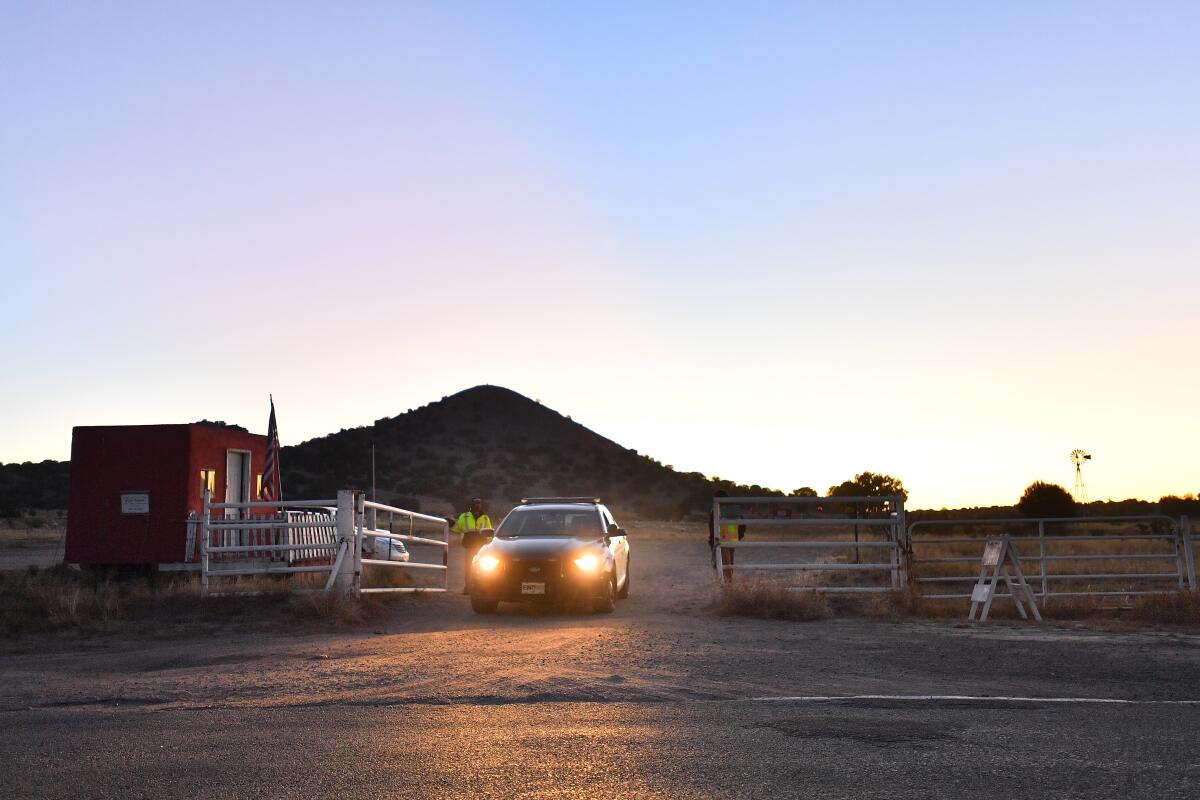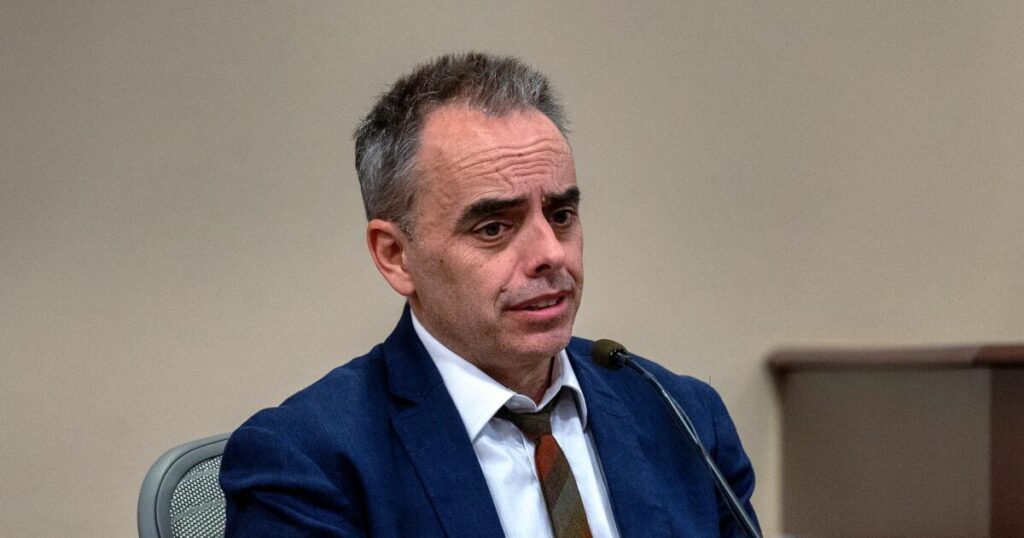“Rust” director Joel Souza, who was injured when Alec Baldwin fired a gun, said he couldn't process what happened on the New Mexico set of the movie — even after he was taken to the hospital.
“I knew something had bothered me,” Souza testified Friday in a courtroom in Santa Fe, New Mexico, on the seventh day of testimony in the manslaughter trial of Hannah Gutierrez. The 26-year-old Arizona woman could spend up to three years in prison if she is convicted of criminal charges against her related to the October 21, 2021, death of Halina Hutchins.
Friday was the first time Souza publicly described the details of the tragic accident that claimed the life of rising cinematographer Hutchins. She had impressive credentials and sought a job on “Rust” because she wanted to work in a Western.
In disbelief that afternoon, Souza recalled fighting with medical staff at the Santa Fe hospital where he was taken by ambulance. He said he insisted that his injury could not have been caused by an actual bullet.
Hollywood safety protocols prohibit the presence of actual ammunition on a movie set.
“I kept saying, 'You don't understand,'” Souza testified before the 12-member jury and four alternate jurors. “This was a movie and this couldn't be possible. They kept saying, 'No, no, no. It is.' [an actual bullet].' Eventually they got tired of my protesting because they showed me the x-ray of my back and there was a very large bullet in it.
Moments before shooting, Souza entered the wooden chapel on the film's set at Bonanza Creek Ranch and moved behind Hutchins, who was discussing Baldwin's next scene. The actor was sitting on a bench, in full costume, facing the door. Souza testified that he did not know who brought the gun to the church or who handed it to Baldwin.
“I went to see what was happening from the camera angle,” Souza said. “What I wanted to do was stand behind Halena to try and catch a glimpse of her…to see what [the camera view] It looked like it, but I couldn't even look at it.
That's when the gun went off.
“There was an incredibly loud bang,” Souza said. “It was deafening. It felt like someone had taken a baseball bat to my shoulder. I remember it clearly, stumbling and screaming. I don't remember exactly what I said.”
Souza testified that he saw crew members helping lower Hutchins to the ground. “Nothing makes sense. I remember at first thinking that [perhaps] It amazed her. …Then I saw blood on her back.”
Baldwin – who was indicted by a grand jury in January on manslaughter charges – said he did not pull the trigger, but the gun went off during training. Baldwin has pleaded not guilty. If convicted, he faces up to 18 months in prison.
The bullet entered Hutchins on the right side of her chest, passed through her and lodged in Souza's shoulder. The 42-year-old mother died later that afternoon after being airlifted to an Albuquerque trauma hospital.
Souza described interviewing eight cinematographers to work on “Rust.” He said he was impressed by Hutchins' backstory — she was born in Ukraine and grew up on a naval base in the Arctic Circle — and her film credentials, including her education at the American Film Institute.
“As a cinematographer, I think that's doubly impressive,” Souza said. “Because if you look at the numbers [of women cinematographers] In our business, they're kind of atrocious in that regard. …She was very keen to do a Western.
He said they bonded over Zoom calls during the pandemic.
“There was just something about Halina,” Souza said. “We were really in tune with what we thought the movie should be.”
After deciding on Hutchins, Souza said he asked the film's producers and production managers to hire her: “Please don't break the deal because she's really great.”
Court TV is broadcasting Gutierrez's trial, which is expected to continue until next week.
Souza testified that he did not have much experience handling guns and ammunition, and that “Rust” was only the second film he had worked on that had weapons and needed a gunsmith. He said he was not responsible for hiring Gutierrez, who was only working on her second film as an armorer.
Trial testimony addressed whether Gutierrez was sufficiently competent; Witnesses described her work as “sloppy” and “unprofessional,” special prosecutors said.
But the director, who also wrote the script for Rust, said the third day of production was a complex day of filming, with scenes calling for gunfire and a Western town filled with horses, donkeys and extras brought in to film. City people. After that day ended successfully, Souza admitted that he sent a message to Gutierrez praising her for her work that day.

A Santa Fe County Sheriff's Office vehicle leaves Bonanza Creek Ranch on Oct. 22, 2021 — one day after cinematographer Halina Hutchins was killed when Alec Baldwin's gun went off.
(Sam Wasson/Getty Images)
Souza said he was unsure of Gutierrez's actions on the day of the shooting. But he had a clear memory of seeing the young gunsmith at the entrance to the church when he was on the ground after being shot.
“She looked distraught. I remember her saying, 'I'm sorry.' I'm sorry, Joel,” Souza testified. “And I remember someone yelling at her and they just took her out.”
Souza testified that Baldwin had initially hired him to write the screenplay for “Rust,” and the two men were eager to collaborate on a Western. New Mexico was chosen because of its generous tax incentives and stunning high desert scenery that evokes the Old West.
During Friday afternoon's trial, the drama escalated during the testimony of paramedic Sherilyn Schiffer — who struggled to treat Hutchins' extensive wounds as the cinematographer lay dying on the planks on the church floor. Schaefer sued Baldwin and other crew members, saying she suffered trauma because she did not have adequately trained medical personnel or medical equipment to assist while waiting for Santa Fe County paramedics to arrive.
A defense attorney suggested that she appear at trial to strengthen her case for financial damages. Schiffer bristled, saying her legal efforts began as a way to bring a greater focus on safety to New Mexico's film community.
Schaefer said she wanted to explain more, and New Mexico 1st District Court Judge Mary Marlowe Sommer agreed.
“I came home that night and looked at my little boy who is the same age as Halina’s son,” Schaefer said. “And all I could think about was how I couldn't save his mother's life and how he would grow up without a mother. How her husband lost the love of his life…”
Sommer suddenly stopped Schaefer mid-sentence.
“I mean no harm to you,” the judge told Schiffer. “But we'll hit that certificate.”
Sommer asked the jury to ignore Schaeffer's personal account.
